By now, I’m happily resigned to being known as “that ‘80s guy.”
My ultimate goal for the other newsletter I publish at Substack, The Last ‘80s Newsletter (You’ll Ever Need), is to eventually collect it all into a series of books, one for each year of the decade. I’ve already written at least two books worth of material and I think if I do finish the entire project, I will eventually have the definitive set of film books on the topic.
I am equally excited at the opportunity to build a new podcast with Aundria Parker and Craig Ceravolo. Today’s the sixth episode of season one of The Hip Pocket, a warm-up season in which we’re all picking movies for one another, one decade at a time, as a way of getting used to each other and to work out all the kinks of recording these conversations. I knew when we started this exercise that it would be particularly interesting to get into this conversation about this specific decade. I’ve already spent so much energy thinking about it… how can we possibly reduce the entire decade to three films?
That’s the thing, though… we’re not. These are not meant to be the three defining films of the decade. They are just three movies we love for various reasons that came out in the ‘80s. I think when you stop worrying about what a film signifies about a decade or an era or a genre and you just enjoy films as films, you can have so much more fun. I love the three movies we discuss in this one, and I think all three of them are movies that have aged in different ways.
By this point in the season, it felt like Aundria and Craig and I were really starting to look forward to each episode, each get-together, each new round-robin of titles. I hope you guys can pick up on that, because it was so rewarding to feel it start to happen. It’s always a question mark when you start something like this. Can you get to a place where you’re just having real conversations and not performing or worrying about the “show” aspect of it? Isn’t that the goal?
Check this one out here, and if you like it, please go to Apple Podcasts and Spotify and subscribe, rate, and review the show. It will help us find new listeners, and in January, we’re kicking off our second season, where we start to bring in actual guests. We just recorded one this past week that was so good it felt like it justified each and every bit of effort we’ve put in so far. I think the way guests are responding to the challenge we’re presenting to them is exciting and revealing and everything I hoped it would be.
For now, it’s still “just” the three of us, and it’s a really fun one…
[The Hip Pocket theme plays]
DREW: Hi, everyone. Drew McWeeny here. You may know me from my time at Hitfix or my early work at Ain’t It Cool or maybe you read one of my Substack newsletters. Maybe you ended up here because of one of the films I wrote. Whatever the case, welcome to my new podcast called The Hip Pocket. What does that mean? Well, I think hip pocket movies are the movies that we carry around with us. Those films that we see that ring some bell or scratch some itch, so we file them away. And whenever we're sharing movies with people, these are the movies we reach for.
Sometimes it's a litmus test to see if we're on the same page. Sometimes you just want to show them this thing that means so much to you as a way of expressing that part of yourself. Sometimes it's as simple as this makes me happy and I hope it makes you happy, too. You learn a lot about people when you talk about these films and why they matter to someone.
I have hundreds of movies that are like this. Movies that have stuck to me for one reason or another over the last thirty years of writing about films and writing them. I am once again joined by two friends who I look forward to sharing movies with for years to come. First up, there's my band leader, Craig Ceravolo. How are you, Craig?
CRAIG: Hello, Drew. How are you?
D: Good. Good. How are things?
C: It was 14 degrees down here in the South when I woke up this morning, and I don't like that. I don’t, I don't do well. So…
D: Well, let's check in with the Jeckle to my Heckle, our co-host, the one, the only Aundria Parker. What's up, Aundria?
AUNDRIA: Hi, guys. Reporting live from the Arctic Circle. I'm ready to go.
D: Now… you're, you're also freezing cold. Yes?
A: The northeast is freezing. It's about 13 degrees here right now. Yep. Loving it every minute.
D: Nice. I am… I, I do miss winter weather. I do miss actual cold. It is January here. That means that it's a little bit rainy and, now, kind of sunshiney. So that's our… that's what it looks like here. It's terrible.
C: Whatever, man. Whatever.
A: Yeah. We have daylight for two hours if we’re lucky. And it's gonna be like that for another two months. So I'm sorry it's “lightly raining.”
D: Yeah. It's lightly raining. Yeah, I don't know, I, I, I mean, I had to wear… I had to wear, like, long pants for the first time. It… yeah, that was…
A: You know what?
D: That was a real bummer.
A: Oh my god. How do you get by out there?
D: I know. So listen, guys, it is finally time for us to talk about the ‘80s. If you listened to ‘80s All Over or you read my newsletter, then you know that this is a topic that I have thought about too much.
It was the decade of President Ronald Reagan, the decade that we learned what AIDS was, tried desperately to ignore it, and then finally got serious about dealing with it. Apple built its first computers. The Iron Curtain cracked and fell. We lost the Challenger and Chernobyl, and the World Wide Web made its debut. All of this and the Thriller video? It is a miracle we made it out.
I want to kick off today. First of all, just to set the stage, what are your memories of the ‘80s, guys? What do you think of when you think of the ‘80s? Because I know what it's become on TV, and I know, like, the code for the ‘80s, but for you guys, what are your memories?
A: Craig, you wanna go first?
C: I will. Because I think, Aundria, that you're significantly younger than me. I don't know if it’s… and I, I don't know what you're…
A: I’m significantly younger than both of you. I'm barely legal.
C: Ooof. Settle down, sister. No, I, I lived through it. Like, you know, I'm only a little bit younger than, than Drew, and that’s, that's my sweet spot. I, I, I was… I was a kid in the ‘80s from.. you know, I, I was in high school in 1989. That was my first year of high school. So I, I lived the entire decade as a child, and I have all those… that's why I love, you know, ‘80s All Over. I'm writing a thing about the movie we're gonna talk about today for another thing because I love that movie so much, and I won't jump the gun, but I, I talk a lot about nostalgia and how it's a double-edged sword and how it's sometimes great to, to, to visit it, but you can't live there. So that's that's how I look at the ‘80s, Drew. I don't know if that answered your question.
D: No, it does. And I, I… it's one of the reasons that I wanted to do ‘80s All Over, and one of the reasons I keep doing the ‘80s newsletter is this idea that nostalgia is the filter you put over things where you pretend like it was all a certain way. And I really love going back and, and looking at the entire decade in context and looking at sort of the way filmmaking changed from 1980 to 1989. It's maybe the biggest year of change ever or biggest decade of change ever in the industry.
And it was a decade of giant money, certainly, but it was also a decade of real sort of risk and invention. And all of the indie explosion that happened in the ‘90s, the seeds were in the ‘80s. And this is the decade where if you were independent, you were genuinely off-the-radar independent.
C: Yeah.
D: I, I think the lineup of films that we picked to talk about today… again, we cover so much ground. These are three very, very different picks. And, yeah, I, I kinda wanna start with… I wanna start with my movie today. My, my movie is a… the, the… I wanna pick a movie that you don't hear a lot of conversation about today. One that feels like it could really only have been made at that moment in the ‘80s, and one that embodies a lot of what I like about the decade. So I'm curious what you guys thought of the 1986 film by Jim McBride, The Big Easy.
[the trailer for The Big Easy plays]
D: Craig, have you seen The Big Easy before now?
C: You know, I don't think I did. I think it was one of those movies that was in the background on HBO or Cinemax when I was a kid, and it, it had no, um… I had no interest in it. Like, it wasn't Star Wars. It wasn't ET. It wasn't anything that was in my wheelhouse. So I, it just looked like a boring adult movie that I had no, I didn't wanna watch. So…
D: Right. You were thirteen when this came out. So, yeah, this would have been nothing you would have been interested in.
C: Nope. Not at all. But my dad's from Kenner, Louisiana, so we went to New Orleans all the time. So it was interesting to see a film about New Orleans, but I wanna hear what Aundria thinks.
D: Okay. Aundria, did you know this movie?
A: I had seen it years ago. I don't know why I had sought it out, but remembered nothing. So I've started this new tag on my Letterboxd, #Itmightaswellhavebeenforthefirsttime, because there's so many movies that I saw once that have completely been erased from my memory.
D: Mhmm.
A: So, yeah, I was excited to revisit it. I mean, like, I was conflating it with the other Ellen Barkin/John Goodman film, Sea of Love, which I…
D: I think that's very easy to do. They were right at around the same time too.
A: Right. Right. So, diving into this one was really, it was good to watch it again. Yeah.
D: Well, it's funny because I… there was a moment in the late '80s, mid to late ‘80s, where kind of Hollywood went insane for New Orleans again. And there, just a moment where it was like, oooh, New Orleans. We're gonna shoot everything in New Orleans. And it’s, and it’s… there's gonna be a lot of voodoo, and there's gonna be a lot of Cajun music, and there… people are gonna have thick accents, and they went berserk for it. And I think part of it was the music. I think part of it was that they were, you know, it was a good place to shoot, and it was very cheap to shoot there. But I also just think there was something about that vibe that, in the late ‘80s, kinda caught fire. And so there was a moment where it was a very popular location. I love Angel Heart by Alan Parker.
A: I was gonna say, one of my all time favorites…
C: Yes.
D: And I love the way he shoots New Orleans, like it's all a funeral crypt, the entire town. But this one is… I, I have always had a real soft spot for this. And this is one of the moments where I'm gonna go ahead and I'm gonna admit something that, by the end of this first ten or twelve episodes, you'll know anyway if you listen. And if you've read my work, you're probably not terribly shocked by this. I kinda like horny movies. I do. I… and I, and I kinda miss horny Hollywood. I, I, I am unabashedly a fan.
C: I’m glad you said something, because I was going to say...
D: This movie is an ‘80s horny movie. And the casting of Dennis Quaid and Ellen Barkin, I think is incredibly combustible. He rolls into this movie like the Joker. Like, his smile is so insane and exaggerated in this film, and I love Ellen Barkin playing kind of a, kind of the librarian stereotype at the beginning of this thing.
A: Buttoned up.
D: Yeah. real buttoned down because boy, when she finally pops the buttons, this movie just becomes incendiary…
[an exceedingly horny clip from The Big Easy plays]
D: … and it's all her. I truly think the reason the movie works is her. She sells the attraction to him. She sells the repulsion for him on a moral level. I think the supporting cast is terrific. John Goodman's great in this. Ned Beatty is such a good piece of shit. He's so good and he's, and there's never… I don't know if you guys picked it up as the movie was going on. I don't think the movie ever really plays it as a whodunnit. I think Ned Beatty is such a pooh bear for the first 2/3 of the movie that you know he's the bad guy. That's the only reason he's in this movie.
[a clip from The Big Easy plays]
D: But I love the, I love the way the movie positions Dennis Quaid as a guy who thinks he's smarter than everybody else in the film. And by 2/3 of the movie in, realizes, I don’t know what the fuck is happening. I am so behind. And it's great. They kind of pull the rug out from under him and his confidence gets shaken, which is the most fun version of Dennis Quaid to watch. I love that stretch where he was a movie star. I love that brief moment in the ‘80s where Dennis Quaid genuinely figured it out and…
C: Yeah, man.
D: … Hollywood knew what to do with him.
C: Innerspace.
D: Yeah. I mean I, I love Innerspace. I love The Right Stuff. I love that whole run of things. But boy, when it ended, it ended. So… yeah, this… this movie definitely feels like it's of a moment for me. And it's one of the reasons I kind of love the, the whole… I love the big suits, I love the overheated lighting of this thing, I love Brad Fidel's score. I think it is a really good use of cop movie 1980s cliches with a lot of New Orleans just thrown on top of it. Yeah. Good movie. Did you guys enjoy it now that you've finally seen it?
A: For sure. I did. And, you know, you're talking about horny movies. One of my core memories of this movie, even before I had seen it, seeing the trailers on TV was like, this is a movie with sex in it for adults. Like, it's a hot… it's hot and steamy just like New Orleans. Right? It was very much marketed as, like, you're not gonna believe what these two do between the sheets. And it's more of a police procedural, kind of, than…
D: Mhmm.
A: … you know, sprinkled… seasoned generously with sex or, like, sexiness, I guess.
D: Well, it's almost like that is the running thread, like are they ever going to get a moment where they get to finally pay it off? And it’s, it's almost handled like a James Bond movie in that sense where the, the end of the movie is now finally they get to go have sex. And it really is, up until then, an immense amount of tease, which I think is what makes it work. I think it's what makes it a sustainably horny film.
A: Mhmm. I agree.
D: Craig?
C: I love you. Right? And I'm getting to know Aundria, and I… (quietly) I don't like this movie. Don't hate me. Don't hate me.
D: No. Not at all.
A: Of course not.
C: No. And, and all jokes aside, I mean… it… I, I, it just doesn’t… it felt very ‘90s to me in a weird way that didn’t… I just… it… I didn't connect with it. I, I the performances were great. She was great. It… my idea of, of New Orleans, and not that it's the true, the only true idea of New Orleans… and this is funny to me, is that when we were kids, we would go to Mardi Gras to visit family, and we'd go see the day parades which are very tame. Like, when, when I was in college was the only, the first time I realized there was a gross naughty Mardi Gras. I'm like, I didn't even know that existed. So I don't have that, like, sultry, steamy idea of New Orleans. And I know it exists, but I just felt like this was trying way too hard to, to make it happen. And I don't know. There's something about it that just… it just… he, he was charismatic, and she was, you know… they, they had… I didn't think their chemistry was all that awesome. And maybe I need to see it again. Maybe I need to see it…
D: No, no, no. I… believe me, we're gonna run into this, man. One of the reasons that these movies are these movies is because these are not the ones that play universally. You know, they are quirky and revealing. And, you know, you are telling something about yourself when you say what it is you like about these things. So, yeah. This is not a movie that I think has aged terribly well.
C: No. It hasn't. I don't think so.
A: Yeah.
D: Yeah. I think that is the biggest thing I would say to anybody who… if I'm recommending it to you, I'm recommending it to you as a movie from 1986. And it is…
C: Totally.
D: There is a “on the dartboard” 1986 vibe to it.
A: Mmmhmm
D: So, yeah, it’s, it's definitely not a movie that it was made with with any regard for… no. No. It's insensitive a little bit. Yeah. Yeah. And, and I do think kinda cartoony. I think that’s… but I think that's the thing with Dennis Quaid. He's a hard guy to cast in total realism, and I think that might have been what ultimately killed him. I'm curious, have you seen Great Balls of Fire, Craig?
C: Yes.
D: What do you think of that one?
C: Cartoon.
D: Because that is also… same director… and it, that is to me this cranked up to about 11.
C: Yeah. I felt like that one was more, like, fun. Like, it…
D: I think they're going for fun there. I… which is a crazy thing to go for with that movie. It is the most fun you will ever watch, the most fun movie you'll ever see about a guy statutory raping his cousin. Like, it's crazy. Yeah. It’s, it’s, it's an insane thing to try and make a comedy out of, but he plays it like Foghorn Leghorn.
C: Yeah. Exactly.
D: “This is between me and God and Muhhhhhhhhhhrnah.” It's his accent in that one. It's wiiiiild.
C: Yeah. I didn’t know it was the same director.
D: Yeah. Same guy. Same filmmaker.
A: Where's Dennis Quaid from? Why was he playing these Cajun dudes? Is he from that area?
D: I’m not sure. I’m… actually, hold on. I will tell you. Because…
A: Or is it just…
D: Whatever. Houston. So the Quaids are all Texas boys.
A: Yeah. Okay.
D: That makes sense. They are authentically Southern.
C: Well, you know, he's no… you know, he's in the shadow of his, of his brother. That's the problem.
D: Yeah.
C: Randy.
D: Yeah, well, I think I think they are running…
A: Shout out to Randy.
D: I think they're running neck and neck again. So, let's not… yeah, Dennis has been on a real tear lately.
C: Has he really? I don't know. I haven't kept up with him.
A: Has he?
D: Oh, good. Good. Don't. Do yourself a favor. Don't.
A: Oh, no.
D: Don't, don't look up Dennis Quaid. Don't. It's okay.
C/A: Oh, no.
D: We'll, we'll put all of our Quaid affection onto Jack Quaid and let him carry the burden for the family from now on. Because Jack Quaid fucking rules. Jack Quaid is like the very best version of what you hope for from a Hollywood marriage. He is absolutely Meg Ryan and Dennis Quaid's kid. Like, you can feel it.
[clip from The Big Easy plays]
D: Alright. So that was my my pick. The Big Easy. And I… I do, I find these very revealing. Aundria, one of the things that I am learning about you…
A: Yes?
D: … as we make these picks decade-by decade is that you are a deeply silly person.
A: Deeply.
D: Because only a very silly person would pick Carl Reiner's charmingly ridiculous Summer School from 1987.
[the trailer for Summer School plays]
D: Tell me why you chose Summer School.
A: Oh my gosh. Okay. I came to Summer School very, very late in life. I think I saw it for the first time maybe, like, a decade ago. And this is after it being, like Craig said with The Big Easy… I remember Summer School was on every weekend on some local cable station. Right? And I never watched it. I didn't know what it was. It didn't appeal to me. When I finally saw it, I was like, how have I lived with this movie not in my life? This is funny. This is charming. It moves super quick. It's very entertaining. It's got weird gore in it, which I just love for, like, a hilarious comedy. It's got some funny gore effects. It's got Mark Harmon and Kirstie Alley at the height of their Mark Harmon and Kirstie Alleyness, if that makes sense. Like, they're both just so… future TV stars trying to make a movie, right? And, and I mean that in the best way possible. I just… it's freaking charming as hell. It's so great. How… I… I feel bad for people who haven't seen it. I want them to see it too, you know? Hopefully, earlier than I did.
D: This one played at… in fact, all three of the movies that we're talking about today played at the theater that I managed. This one was a movie that… you know, we would show things to employees a couple of nights before they opened, and if you wanted to stay and do the tech run-through for the projectionist, you could watch the movie. And so this was one of those that everybody showed up just to see something and nobody had any expectations.And it ripped the roof off the employee screening.
A: Nice.
D: It was so much fun. I really enjoyed this movie when it came out, and I… you know, perfect age for it. I think it is, like almost every Carl Reiner movie, very aware of exactly what movie it is. Like, what the comedy is, what the joke is, what the tone is. Carl Reiner… I love his Steve Martin films. I think the movies he made with Steve Martin are masterpieces. But I think in general, Carl Reiner adapted to whatever comic persona was at the center of the movie, and he would figure out the right way to do that. Mark Harmon has no other great movies. There are no other Mark Harmon movies where it's like all of it works. And it's a real shame. I don't think Mark Harmon's bad. I think he's very charming in this movie. But…
A: That's why he played Ted Bundy. Right? I mean, because he's just a charming, like, dude.
D: Hilarious as Ted Bundy. No. No. It’s… you're right. That's exactly why. It's because of that charm, because that surface level charm that… in this movie, that's the joke, is that he is exactly that deep. That it is not hiding anything. That there is nothing underneath. And Shoop is hilarious. I really find him… I think his relationship with Wundermutt is great. Wundermutt's the best. And I think the kids are so well cast in this thing. You mentioned the gore. Chainsaw and Dave… for a nerd at 16, 17 when this came out who wanted to make horror films…. Chainsaw and Dave were obviously my boys. Like, how could you not love them immediately?
[clip from Summer School plays]
D: And I thought Dean Cameron was going to be huuuuuge. I truly thought after this movie, Well, Dean Cameron’s just one of those guys. He’s going to be playing the Michael Keaton roles and the Tom Hanks roles and he’s gonna be…
A: Mmmhmm.
D: … and it just didn't happen. He played like a version of Chainsaw in two or three other movies that were very much like this, and that's it basically. And it’s, it's one of those movies where I think the chemistry is perfect. I think all the people who are in it are very good, and it knows exactly what film it is joke-wise. Like… its comedy set pieces really work. I think the verbal banter works. I am amazed at how they navigate potentially creepy stuff all the way through the film and somehow end up on the side of right.
A: It’s amazing.
D: I do not know how they get away with Courtney Thorne- Smith at all. I don't get it, and somehow the film is right-footed, and at the end of the movie you're like, well, that was all navigated. Right? I, I'm okay with… but it's crazy stuff.
[clip from Summer School plays]
D: … and the blackmail, the ongoing blackmail is a wild plot point that… for a lot of the film, just… they get away with murder in this thing. It's great. It's very much a silly movie and I think it was a great experience in the theater. Craig?
C: Standing ovation. I love this movie so much. Sorry, Drew. No. I, I love… I watched this movie probably thirty times in the summer of whenever it was on HBO every day. And I would quote it all the time. I think Mike Myers and Dana Carvey owe Chainsaw and…
D: Yeah.
C: … what's his name?
A: For sure.
C: What do you… I forgot his name.
A: Dave.
C: Dave. Dave and Chainsaw. Those are proto-Wayne’s World. I think that totally… like, that, that feels like the first time that there's that heavy metal gore buddy, like, that relationship is so sweet that…
D: And it's pre-Bill and Ted too.
C: Pre-Bill and Ted.
A: Yeah. Yeah.
C: Yeah. I recently went on a cruise… about a couple months ago, and I… this is not a lie. I made sure I… I was like, what do we wear on a cruise? And I just used Mark Harmon's wardrobe throughout this entire movie.
D: That's exactly right.
A: You can't go wrong with that.
C: Swear to god. I will go show you the shirts right now. It is a lot of Hawaiian…. it was a lot… it was, it’s…. he is so charming, and you've nailed it. It… he… Carl Reiner built this around his lackadaisical goofiness. Kirstie Alley is charming as her… RIP… is amazing in this.
D: Yeah.
C: She's beautiful. She's funny.
A: Yeah.
C: You know, she's coming off of Cheers. Right? I mean, this is…
D: … coming off. Yeah. I think she's on Cheers at this point. And…
C: Okay. Okay. Okay.
D: … she’s, she is absolutely ten steps ahead of him, so much beyond him, and he knows it. He’s, he loses every scene with her, which is another thing that just makes it winning is there is never a moment that she's not ahead of him and winning… is there is never a moment that she's not ahead of him and in charge of every scene.
[clip from Summer School plays]
A: She's got this, like, she's got this, like, you know, “It factor” quality, whatever you wanna call it, that you just kind of look at her, and you're like, oh, this is… she's bigger than this. Like, she's gonna go on to things that are so much bigger than this. And did she? Kind of. Probably not to what we thought or hoped she would. But, yeah, there.. she's just… she kinda crackles even though she's playing kind of a, a, a side character, you know?
D: Yeah.
C: Yeah.
A: She's playing the straight man.
D: Yeah. I, I love the payoff for the Larry storyline.
A: So good.
D: I, I love him.
A: Young Jim Carrey.
D: And I love how long that goes on before they finally pay it off. Like, he is just the sleepy dude for 2/3 of the movie. Like, it's like… it's a really long…. and even better is the dude who takes the bathroom key at the beginning and then comes back at the end.
C: The football player?
D: That is where Carl Reiner… the comedy boomerang he throws with that.
A: Yes.
D: And the way it comes back and just… beautiful payoff.
[clip from Summer School plays]
D: He really… this is maybe the most shambling movie he ever made. It feels kinda loose and shaggy, and like it doesn't quite hold together as a script, but that's exactly right for Summer School.
C: Yeah.
D: Like that is the way this thing should feel. Like there's five or six different little mini-movies in it.
A: Yep.
C: And the stakes are so low, you know? I mean, you want these kids to graduate, but it's like… but it's like, what is going on here? But, you know…
A: And he’s…
C: Oh, go ahead.
A: That's fine. I was gonna say, like, Drew said, they are continuously blackmailing this man and at what stakes. Right? Like, they're getting these outlandish favors and gifts to do something that essentially they should be doing anyway. Like, it… you know, it's ridiculous.
C: You know, I, I, I… you always think… Drew, you're the writer, but I look at stuff like this, and I… it's such a perfect vacuum of a movie.
D: Mhmm.
C: You know what I mean? Like, it’s, it's a perf… they don’t… I, I hate to say they don't make them like this anymore, but even when, like, a Netflix teen comedy tries to do something like this, it never hits it.
D: No. No. I think it… I think it helps that Reiner had been around for as long as he had and, and that he was kind of the pro he was. Because this, this movie is really polished. It has a really strong sense of identity, and it's low-budget but it looks great for the budget.
C: Yeah.
D: I’ll tell you one thing that it really benefits from, and it's the beginning of this because this is ’86, so this is just one year after Pee Wee's Big Adventure. But the use of “Happy” and then the sound of Boingo that they kind of drop through… it, it's a really peppy way to set a tone for this movie. And it was one of the… he's one of the first guys who was like, that is exactly the way to set the table. And I think it's right before everybody else started really figuring Elfman out. So it's an early example of using Elfman right and really setting the table with his sound.
C: Yeah. And you can't go wrong with Oingo Boingo ever.
[a bit of the Oingo Boingo song “Happy” plays]
D: So Craig…
C: Weird… Weird Science, too.
D: Speaking of…
A: Speaking of Weird Science…
D: (laughing) Speaking of Weird Science…
C: Did you like how I did that?
D: … that was maybe the best way to make this transition. I really love your pick this week, Craig. This is one of those films that noooobody saw when it came out, and it was very lonely enjoying this movie. And I feel like it has still barely been reclaimed or rediscovered, and that is a shame. I'm a big fan of almost all of this guy's movies, but in particular, I adore Keith Gordon's 1988 debut feature, The Chocolate War.
[trailer for The Chocolate War plays]
D: So tell me about your… tell me about your affection for this one, Craig. When did it start? When did you see this thing?
C: Okay. I love this movie obviously so much. But I read the book by Robert Cormier. He was a really popular young adult novelist. The Cheese Stands Alone is one of them. I can’t… there's countless ones. But in 9th grade, I had to read The Chocolate War. So thanks, Miss Dollar, for making me read The Chocolate War. And it really resonated with me. It's about a kid in 9th grade at a Catholic school who was just kicking against the wind, the universe.
He has a poster in his, his locker that says, “Dare I disturb the universe?”, which they don't cover in the movie in a weird way. I thought that was the through line for this film. It's dark. It's moody. It's broody. It's existential. And that was right where I needed to be with my Cure-loving self at 9th grade. This went… and so I was waiting for this movie to come out. I remember seeing a trailer for it going, are you kidding me? So I had no idea about the cast. It didn't matter to me. It was the source material that I adored.
So when I, when it finally dropped, I think I, I had my local video store, Video Express in Midfield, Alabama… and there was this nice lady that worked there who knew nothing about movies, but she was very sweet to me. She knew that I was on the lookout for it, and she held it for me. And… right? And, and I, I loved it. Here's the thing about this movie is it’s, it's exactly how the book felt to me. There's a lot of changes that they made in it. Keith Gordon did an amazing job out of the gate. But as you guys know, I filter everything through music. Right?
D: Mhmm.
C: So…
A: Mhmm.
C: … the soundtrack to this movie…
D: Mhmm.
C: … is perfect. Okay? It's Yazoo or Yaz. Yaz, as as we know them on this side of the world.
D: Yeah.
C: And it’s, it's Peter Gabriel.
D: Yeah.
C: It’s… this movie had a $500,000 budget. And they begged, I guess, to have these artists lower their fees for this film. Because… here’s, here's the kicker, guys, and I'll stop talking. At the very end of this movie, it's Kate Bush’s “Running Up That Hill”. It had never been used in a in a movie before. So when everybody went gaga over Kate, and I… it's one of my… I love the song. When my daughters really started to listen to it, when Stranger Things took it and ran with it a couple of summers ago, it made me think of this all over again. That song is timeless, but this movie was still ahead of itself in terms of what… how to set a tone. And I give Keith Gordon and the entire cast the credit. Anyway, I'm done. That’s, that’s… I bet… Aundria, have you seen it before? I don't know.
A: I had not seen it before, but I had read the book, 10th grade, Mr. Miller. Thank you.
D: Nice.
A: At the time, I remember everybody in my class hated the book because we just were like, but why is he doing this?
C: Mhmm.
A: But why doesn't he just sell the chocolate?
D: Mhmm.
A: “But why?”
D: It's Bartlesby.
A: And my teacher, my teacher, I remember, was getting so frustrated with us just trying to explain the weight of this situation. And, and, you know, and, and I don't know why we didn't watch it in class, come to think of it, but it was something I was vaguely familiar with, but I'd never seen the movie. So, it… did I like it? Yes. But it… the mood of it, the tone of it actually, it made me wanna read the book again. So I think that's a win. I think that's a powerful interpretation of it. I, I do remember the book ending differently than the movie ended. I think Craig alluded to that. There were some changes made. But it's grim and it's dark and it's somehow hopeful at the same time. And I think it does capture that feeling of when you're a teenager and you're starting to realize how big the world is and how little control you have over your own world at that time and just trying desperately, grasping at anything to try to have some control over something, because you seem really… you feel untethered at that age…
C: That’s a really good way of putting it.
A: … and that is something that can't be captured well. You know what I mean? And this nailed it perfectly, that sort of desperation to control something, anything.
C: Yeah. Nice.
D: I…
A: Yeah. So thank you.
C: Oh, yeah.
[clip from The Chocolate War plays]
D: Yeah, I, I love Keith Gordon. I think he is a terrific actor. I think, he, in Christine, gives one of my favorite horror movie lead performances of the decade.
A: I couldn’t agree more.
D: I think he's so so good as Arnie. It is ridiculous. I love his Brian De Palma work. And with Brian De Palma, like, he made Home Movies, which if you haven't seen it is basically a student project from Sarah Lawrence University where DePalma was teaching and they made a movie where his students had to make a movie with him and eventually got released. And it's a very strange kind of meta project. Kirk Douglas is in it. Nancy Allen is in it. And Keith Gordon was one of the students. He was one of the people that wanted to learn to be a filmmaker.
So this was not something that came after he'd been around… he went into this business wanting to tell stories and became an actor as sort of a way to facilitate that. I love that he’s… right out of the gate, so concerned with building a world that reflects the inner life of this book. Most of his work is adaptation stuff. I, I love his adaptation of Mother Night by Kurt Vonnegut. I think it’s an unbelievably good movie. I think A Midnight Clear is incredible. I think he's a terrific filmmaker, but it's clear that he reads a piece of material and he gets a very strong visual sense of it.
And The Chocolate War is surreal. It's a strange movie. It is a strangely stylized movie, and I love the fact that Tom Richmond, the guy who shot it, is this giant photographer from the ‘90s. He did a ton of stuff you know. This was early for him and it feels like a guy kind of really showing off. Like I'm gonna make a a reel for myself out of the… even if nobody sees this movie, I'll be able to cut a three-minute reel that shows that I know what I'm doing. The whole film has this really strong, black and white almost aesthetic to it, which then is reflected in the way I think the cast works. I like Ilan Mitchell Smith a lot. I think he's a very good lead.
C: Mhmm.
D: But the performance in this movie that is the oh my god, what is happening? is John Glover. John Glover is off-the-charts fantastic in this movie. And it's one of those things… I would imagine he read it and just started vibrating and was like, I know… I know what to do with this.
C: Yeah.
D: And just…
C: He's so good at that.
D: … and just kills it. He's so good. And I think Wally Ward is a really effective younger counterpart to him.
[clip from The Chocolate War plays]
D: Doug Hutchison, who I met and got to know on Green Mile…
C: Oh, yeah.
D: … I think Doug is… it's a really good early performance from him where you see the seeds of all those later performances where Doug is just unflushably squirmy.
C: Yeah.
D: And I, I think he's very good. And, you know, the whole film is packed with people.
Craig, I don't know how you feel about this actress, but, Jenny Wright is in this film…
C: (sighs) I know. I know. After Dark, man. Not, not After Dark, what's it called?
D: Yeah. Near Dark. Near Dark. World According to Garp. Pink Floyd the Wall.
C: Pink Floyd the Wall, man.
D: Yeah. Jenny Wright in general, is one of the ‘80s girls who I, I really… left a very large shadow because that's all she did. She was an ‘80s girl and she disafuckin'peered. So it does… it's almost vampiric. Like she's just that age permanently forever. And in this movie she is perfectly cast. She's the girl who represents everything Ilan Mitchell Smith wants to be and do, and she's just willing enough to open the door to that to him. Oh, she's so good in the movie. Yeah. It’s, it's cast great. It's so, so well cast. Bud Cort is terrific in his scene.
C: Bud Cort! Yeah. That one scene.
D: Right? I mean… and I love that scene. I love the way they're screwing with him…
C: Yeah.
D: … and he knows it. And I love the the way… that's such a great game scene where as an, as actors, you're all just given a game that you're playing and they play the shit out of it with him in that scene. Yeah, man. What a great pick. I love the use of the Peter Gabriel song. That is haunting. And I think in general Peter Gabriel was one of those guys who, during the ‘80s, so so many filmmakers turned to him and used him in very particular ways and moods and had such a cinematic sound even when he wasn't doing scores.
C: Yeah. But I would say that the Last Temptation of Christ score is…
D: Oh my god. One of the great scores of all time. But I… also, Birdy.
C: Yeah.
D: When I think of Birdy, the, the way they use… “Family Snapshot,” is it?
C: Mhmm.
D: Yeah. It’s, they, the… he is the… Manhunter, of course, with Peter Gabriel. There's so many movies in the ‘80s that memorably used his music.
A: Say Anything.
C: Yeah. Say Anything.
A: Say Anything.
D: That's right. Home fucking run.
C: That’s the one that just solidifies it right? And, you know, and, and the way that “Salisbury Hill” gets, like,
D: Uh-huh.
C: It's satirized now. Like, it was the, it was the go-to romantic comedy…
A: Vanilla was a great use of it…
C: … and it’s a great song! That…
D: Yeah. There was something about… he uses it here and it's very chilling. He gets right to that, that really alienating, disconcerting Peter Gabriel from the late ’70s and the early ’80s. That's what, that's what's so wonderful about the way he uses him here. Great film, man. Great pick.
[a snippet of Peter Gabriel plays]
D: This has been a really fun episode, man. I… our next episode is gonna get a little grungy. It is time for the decade of the indie explosion of the 1990s and we have a gorgeous lineup of movies for you. There's a maybe musical, a heartbroken little film with one of the decades defining movie stars, and a coming-of-age movie that was one legend's final film and one movie star’s first. So we'll see you back here very soon for another episode of The Hip Pocket.
[The Hip Pocket theme song plays]
NEXT TIME
I apologize for the formatting of this transcript. There’s something buggy about Substack’s back end today and I’m unable to properly copy-edit everything. I’ll make sure we’ve got that sorted out before the next thing I publish.
Meanwhile, we’re getting close to finishing up this first season. #107 takes us up to the ‘90s, and I think it’s one of the more personal conversations so far as we delve into my first decade in Los Angeles and what Aundria and Craig were doing during that same period. Did we pick movies from the American indie revolution? Did we find some studio gems? I guess you’ll have to meet us back here in just one week to find out!
And in the meantime, tell people about the podcast! We’re brand-new and we need your help to get other people to check us out. If you like the show, you can support us over at Patreon or by subscribing to this newsletter, which means you also get access to the printed Hip Pocket columns written by me as well as everything else I publish here.

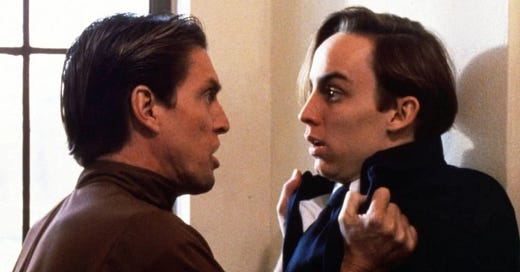


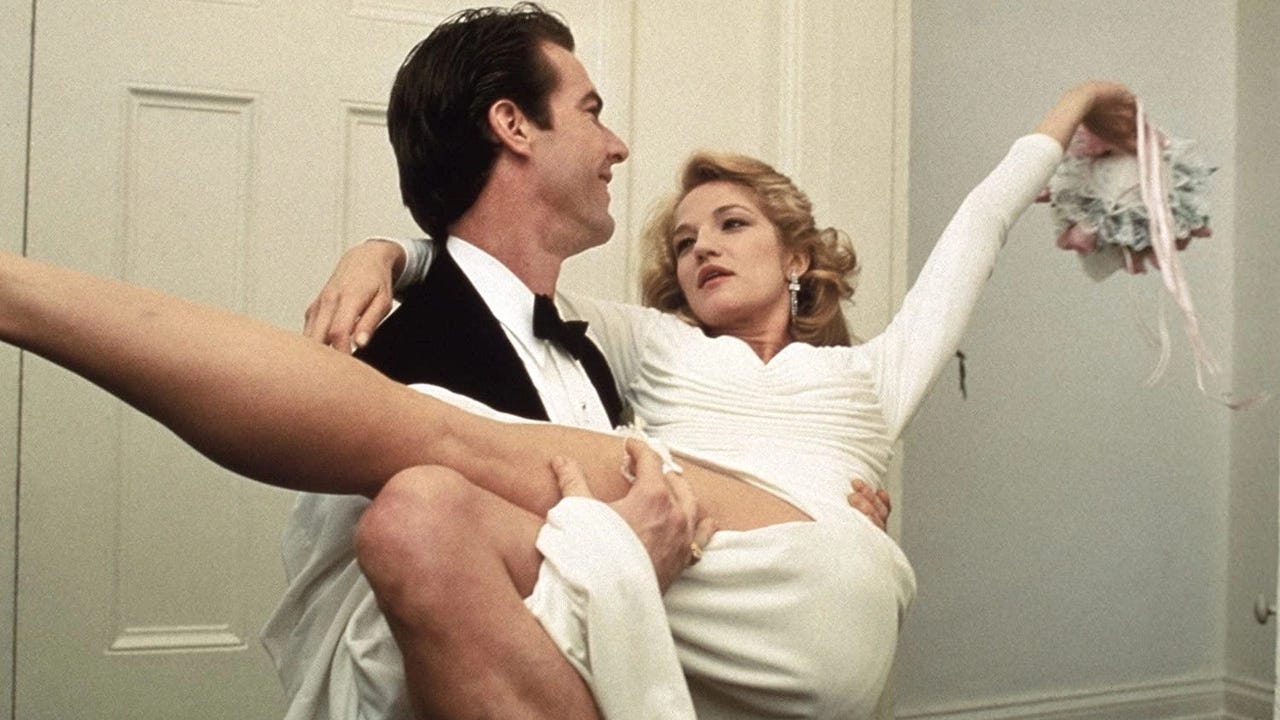
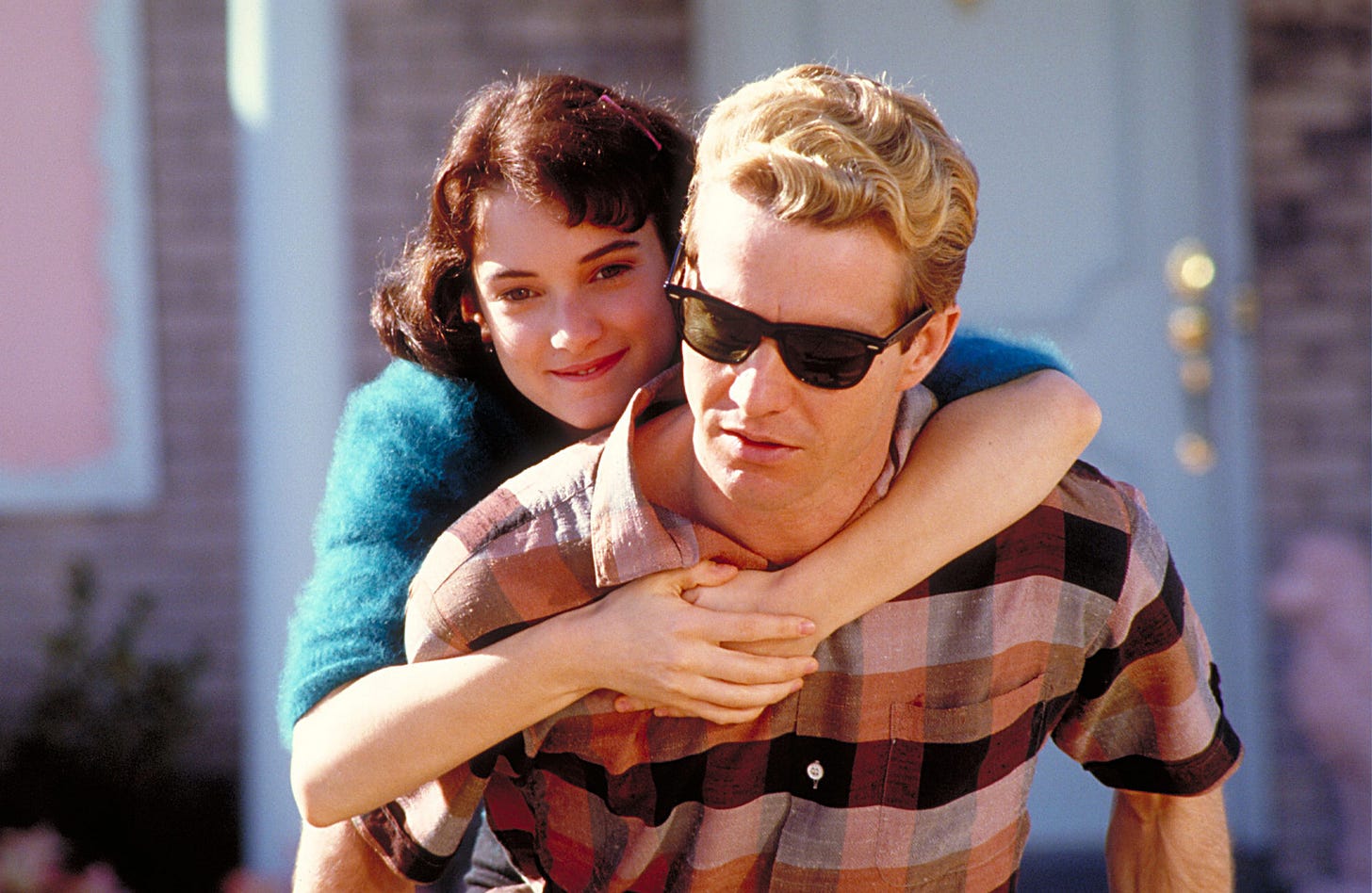
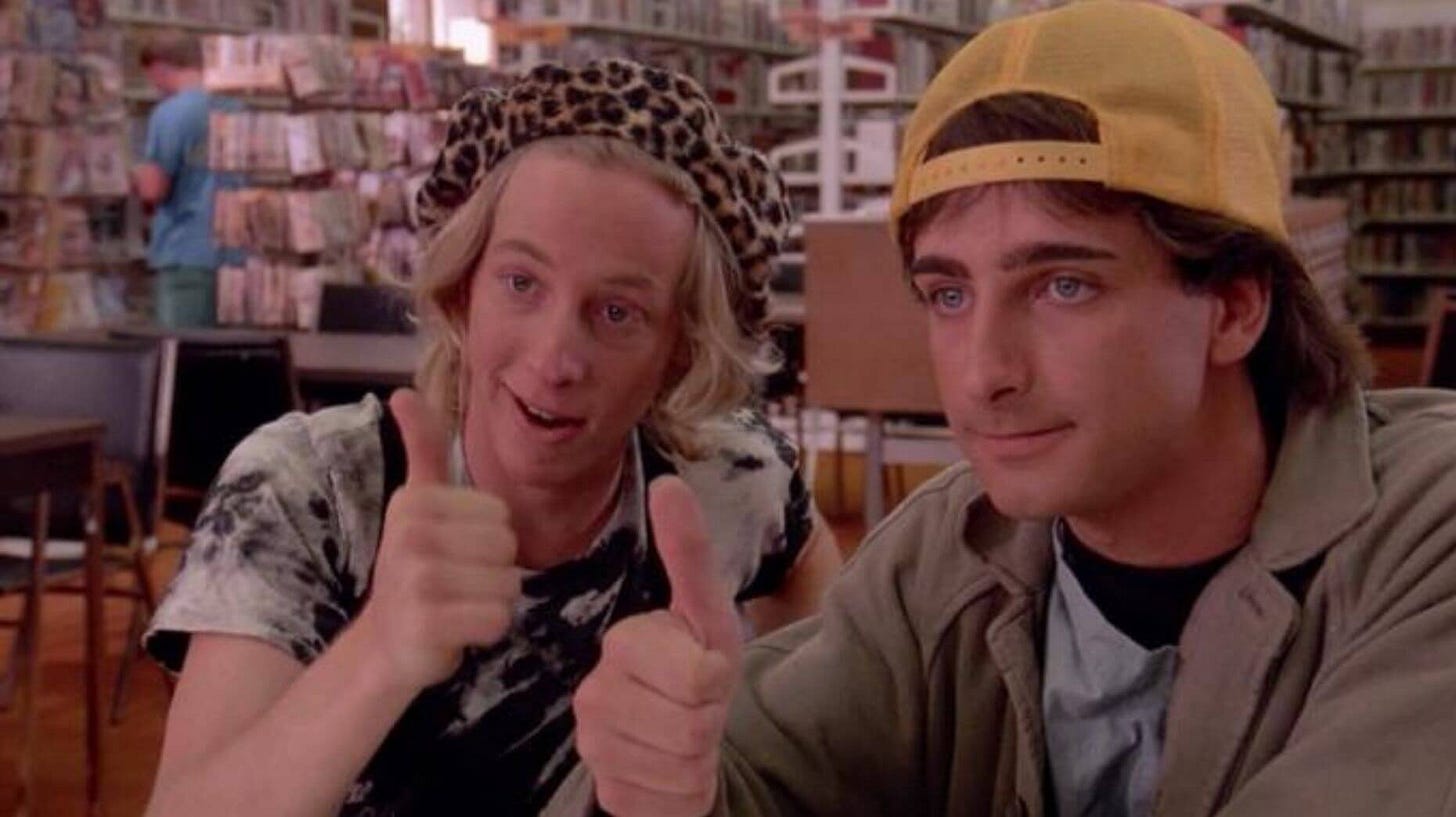
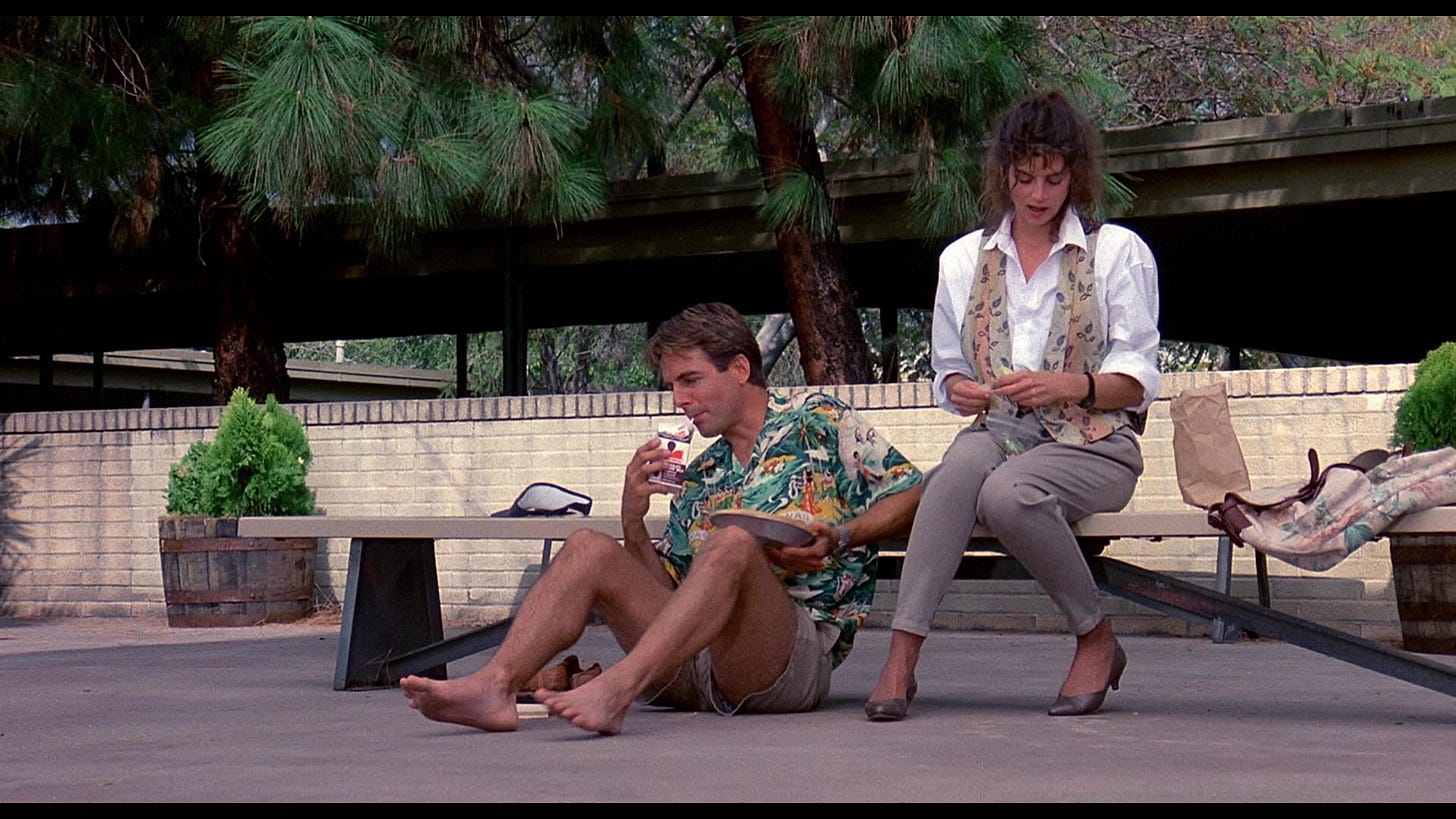
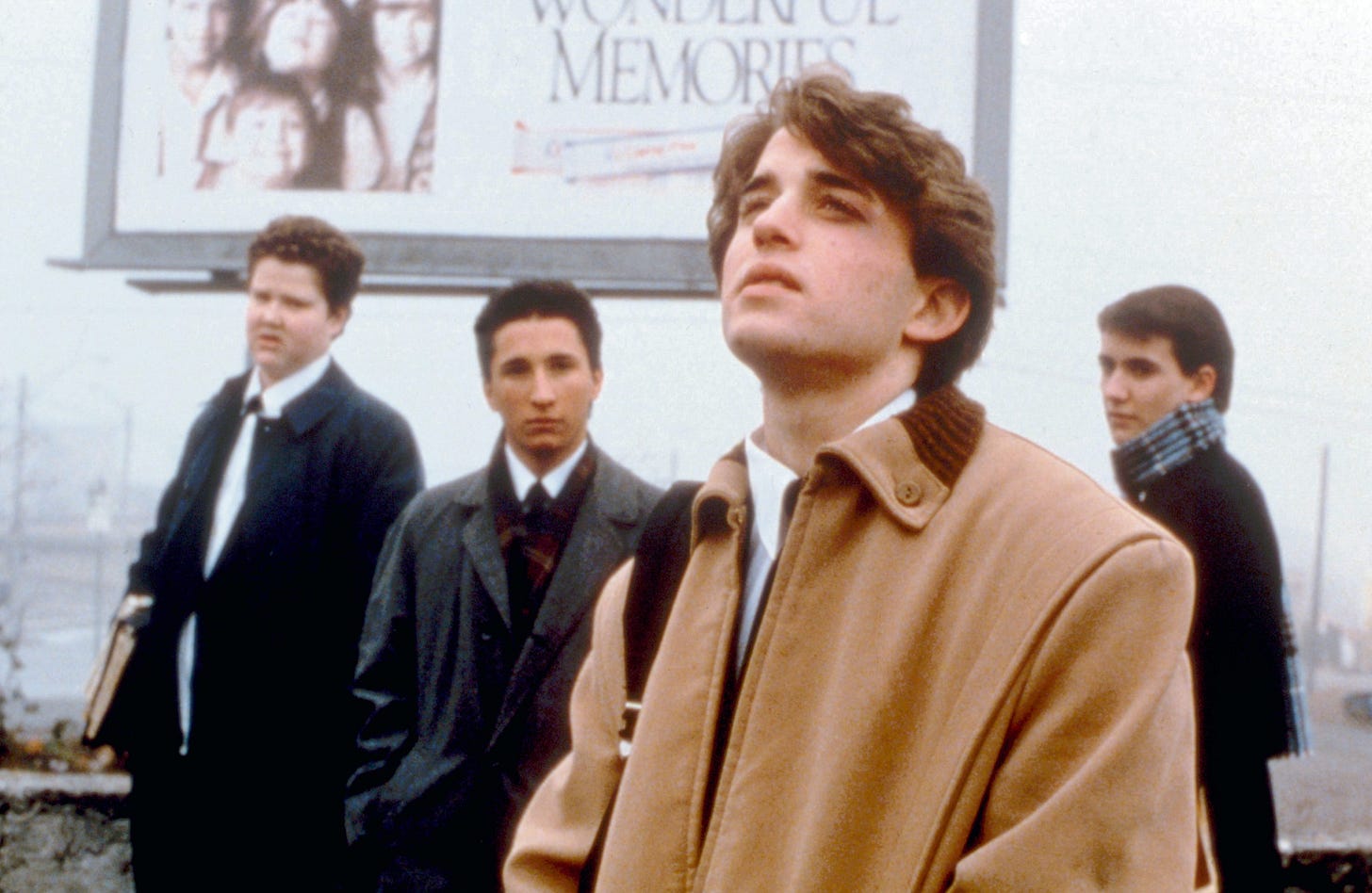


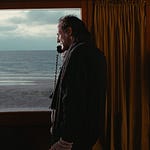
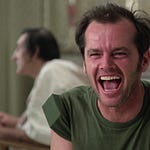

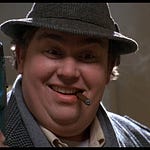
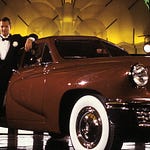



Share this post